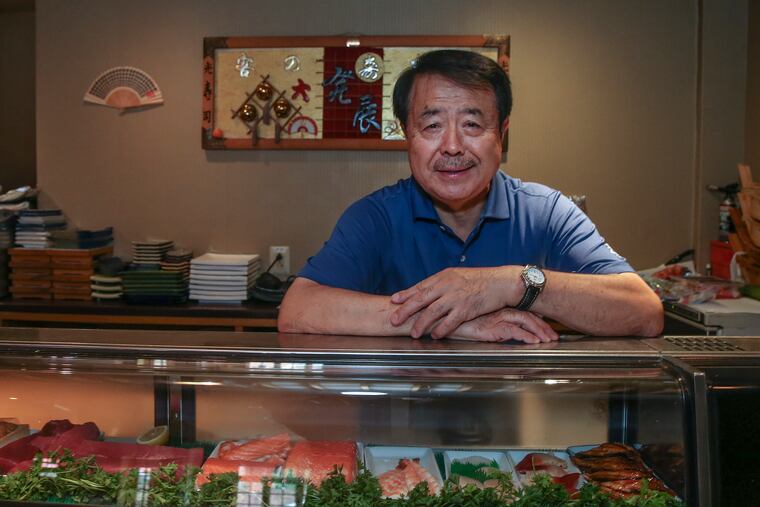‘Stash’ Yoshida, Hikaru’s sushi pioneer, rolls out into retirement
He came to Philly in 1972 to become a short-order cook.

After 35 years in the restaurant business, Takashi "Stash" Yoshida retired last week, closing the first (and last) of his Hikaru restaurants — one of the earlier Japanese restaurants in Philadelphia.
Yoshida's tidy double storefront on Second Street just below South should not be empty too long, as he is negotiating with the owners of a Chinese restaurant in Center City to take it over. In retirement, Yoshida will tend to his real estate portfolio, which includes the Queen Village building, and he will volunteer with the SPCA.
We sat for a chat last week.
Why retire? You’re only 68.
If I want to live to be 100 years old — and I do — I want to be healthy.
What brought you to the United States?
I came in 1972. I was out of college, and I wanted to see what's worldly, so I went to Europe first. Then from Copenhagen, Denmark, I came to the U.S. I got off the plane at John F. Kennedy. A lot of Japanese people were traveling then. Japan hosted the Tokyo Olympics in 1964, and after that anybody could get out of the country. Before, it was only like politicians or entertainers. A lot of younger people took off, and that's why I went to take a trip then. I never thought that I would want to stay here after I went to Japan.
How did you find Philadelphia?
Through the Nippon Club on 57th Street [in Manhattan]. My money ran out, and I saw a notice for a part-time job in Philadelphia. Kitchen help. American restaurant. I figured there were Japanese people working there. It was Sip 'N Steaks in Manayunk. I became the short-order cook.
How about that? You had a Hikaru on Long Beach Island in the mid-’80s and another on 18th Street in Rittenhouse. But wasn’t there a Hikaru location a few doors away from there?
Yes. That was open from 1993 to 2014.
Let’s go back in 1983 and the first location, off South Street. What was it like in the early days?
It was busy, mainly because of the comedy club Going Bananas next door. Barney Weiss [the owner] knew an editor at the Inquirer, who had someone write something. The first night, we had 73 customers. People didn't know about sushi, that's for sure. Customers would come in and sit down at the sushi bar. They don't know know, but they pretended like they knew it. The first thing they ate was wasabi. "Tuna fish," they used to think it was Chicken of the Sea. Every day, someone made the mistake, and we would have arguments at the sushi bar. "Tuna is white!" Other people would think we served Chinese food. They didn't know the difference. They opened the menu and, "Oh, where is the wonton soup?"
Tell me about business for you over the years.
The '80s were good, the '90s were good. Early 2000s, it started slipping down. The neighborhoods changed.
But your Rittenhouse location?
I think I was there too early.
Tell me about your family.
My wife is Atsuko. We have a son, Benjamin. He works for a hospital in the pharmaceutical department.
He didn’t want to go into the restaurant business?
No, he's a typical American boy. He wants Saturdays and Sundays off.